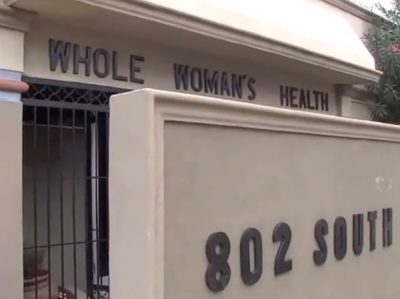Abortion Provider Expands to New Mexico in Response to Texas Anti-Abortion Law
As a lawsuit challenging Texas' highly restrictive abortion access law winds its way through the federal court system, one Texas abortion provider announced Wednesday that she would expand services into neighboring New Mexico.

As a lawsuit challenging Texas’ highly restrictive abortion access law winds its way through the federal court system, one Texas abortion provider announced Wednesday that she would expand services into neighboring New Mexico.
The move would ensure that many patients in Juarez, El Paso, and southern New Mexico would continue to have access to safe, legal abortion care whether or not the Texas law is upheld.
“We’re here to state clearly and proudly that politicians’ efforts to close our doors have not discouraged us and have not subdued us,” said Whole Woman’s Health CEO Amy Hagstrom Miller, whose group of reproductive health-care providers will expand operations into four states as of September 15, when a Las Cruces, New Mexico, Whole Woman’s is set to open its doors.
Whole Woman’s currently operates clinics in Texas, Minnesota, and Maryland.
“We’re stronger and more determined than ever,” said Hagstrom Miller. Though Hagstrom Miller has shuttered Texas clinics in Beaumont and Austin in recent months, a recent federal court ruling has enabled her to reopen a facility in McAllen, Texas, bringing legal abortion care back to the Rio Grande Valley, pending court rulings in favor of the State of Texas and HB 2.
Her facilities in San Antonio—including one abortion-providing ambulatory surgical center—and Fort Worth also remain open thanks to the federal court ruling.
During the Wednesday press conference, Whole Woman’s also announced the new Whole Woman’s Advocacy Alliance, intended to “encourage open an honest conversations” about abortion care and abortion stigma, and “engage people to stand up to harmful restrictions that threaten women’s health in Texas and beyond.”
Whole Woman’s, along with a handful of other independent Texas abortion providers, secured a victory in federal court Friday when a district judge ruled that HB 2, the anti-abortion access law famously filibustered in June 2013 by state Sen. Wendy Davis, is unconstitutional.
Western District judge Lee Yeakel agreed with Texas abortion providers and university researchers who argued that the law would disproportionately negatively affect low-income Texans and Texans of color who could not travel hundreds of miles round trip, often staying overnight, to obtain a legal abortion in one of Texas’ major urban centers.
HB 2 requires, in part, that abortion clinics operate as hospital-like ambulatory surgical centers and mandates that abortion-providing doctors have hospital admitting privileges.
In his opinion blocking the enforcement of HB 2, Yeakel wrote that HB 2’s combination of restrictions “creates a brutally effective system of abortion regulation that reduces access to abortion clinics thereby creating a statewide burden for substantial numbers of Texas women.”
The Texas attorney general’s office, which is defending the law, immediately appealed Yeakel’s ruling to the Fifth Circuit Court in New Orleans, only to have its request for an emergency injunction swiftly denied.
Had the appeal been granted, it would have allowed the state to enforce HB 2 and effectively shutter all but eight of Texas’ legal abortion providers.
The Fifth Circuit has scheduled the next HB 2 hearing for September 12.
